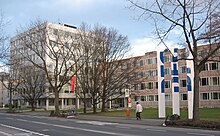Deutsche Forschungsgemeinschaft
Deutsche Forschungsgemeinschaft
Jump to navigation
Jump to search
 | |
| Abbreviation | DFG |
|---|---|
| Predecessor | NG |
| Formation | 1951 |
| Purpose | Science funding in Germany |
| Location |
|
Region served | Germany |
Official language | German |
President | Peter Strohschneider |
Main organ | General Assembly |
| Website | www.dfg.de |
The Deutsche Forschungsgemeinschaft (pronounced [ˌdɔʏtʃə ˈfɔɐ̯ʃʊŋsɡəˌmaɪnʃaft], DFG [ˌdeːʔɛfˈɡeː]; English: German Research Foundation) is a German research funding organization.
Contents
1 Function
2 Background
3 Structure
4 Notable fundings and cooperations
5 See also
6 Notes
7 Bibliography
8 External links
Function[edit]

Site of DFG in Bonn, Germany
The DFG supports research in science, engineering, and the humanities through a variety of grant programmes, prizes and by funding infrastructure.[1] The self-governed organization is based in Bonn and financed by the German states and the federal government.[2] As of 2017, the organization consists of approx. 100 research universities and other research institutions.[3]
The DFG endows various research prizes, including the Gottfried Wilhelm Leibniz Prize.[4][5] The Polish-German science award Copernicus is offered jointly with the Foundation for Polish Science.
According to a 2017 article in The Guardian, the DFG has announced to publish its research in free online journals.[6]
Background[edit]
In 1937, the Notgemeinschaft der Wissenschaft (NG) was renamed the Deutsche Gemeinschaft zur Erhaltung und Förderung der Forschung ("German Association for the Support and Advancement of Scientific Research"), for short known as the Deutsche Forschungsgemeinschaft (DFG). Even before the election of the National Socialists to power in 1933, projects funded by the NG had worked diligently on Nazi-aligned research, especially German ethnographic research in Eastern Europe that would lay the foundations for the Hitlerite "Lebensraum" and extermination policies; during the National Socialist period, the NG leadership showed itself ready and willing to adapt to the “new era” by gearing its funding practices towards issues related to armaments and autocracy, essentially aligning its goals with the those of the new regime.[7] By the end of World War II in Germany, in 1945, the DFG was no longer active. In 1949, after formation of the Federal Republic, it was re-founded as the NG and again from 1951 as the DFG.[8][9][10]
Structure[edit]
The legal status of the DFG is that of an association under private law. As such, the DFG can only act through its statutory bodies, in particular through its executive board and the General Assembly.[11]
The DFG is a member of the International Council for Science and has numerous counterparts around the globe such as the National Natural Science Foundation of China, the National Science Foundation (USA) and the Royal Society (UK).[12]
The DFG has several representative offices in Asia, North America and Europe and also maintains the Sino-German Center for Research Promotion, which was jointly founded by the DFG and the National Natural Science Foundation of China.[13]
On 9 June 2012, DFG launced a centre in Hyderabad, to expand its presence in India. The German-based research foundation and India's Department of Science and Technology are together working on 40 bilateral research projects in science and engineering.[14] The Deutsche Forschungsgemeinschaft is a member of Science Europe.
Notable fundings and cooperations[edit]
- German National Library of Economics
- German National Library of Medicine
- German National Library of Science and Technology
- Greenpilot
- Virtual Library of Musicology
See also[edit]
- Open access in Germany
Notes[edit]
^ "Mission statement of the DFG". DFG. Retrieved 2017-08-18..mw-parser-output cite.citationfont-style:inherit.mw-parser-output .citation qquotes:"""""""'""'".mw-parser-output .citation .cs1-lock-free abackground:url("//upload.wikimedia.org/wikipedia/commons/thumb/6/65/Lock-green.svg/9px-Lock-green.svg.png")no-repeat;background-position:right .1em center.mw-parser-output .citation .cs1-lock-limited a,.mw-parser-output .citation .cs1-lock-registration abackground:url("//upload.wikimedia.org/wikipedia/commons/thumb/d/d6/Lock-gray-alt-2.svg/9px-Lock-gray-alt-2.svg.png")no-repeat;background-position:right .1em center.mw-parser-output .citation .cs1-lock-subscription abackground:url("//upload.wikimedia.org/wikipedia/commons/thumb/a/aa/Lock-red-alt-2.svg/9px-Lock-red-alt-2.svg.png")no-repeat;background-position:right .1em center.mw-parser-output .cs1-subscription,.mw-parser-output .cs1-registrationcolor:#555.mw-parser-output .cs1-subscription span,.mw-parser-output .cs1-registration spanborder-bottom:1px dotted;cursor:help.mw-parser-output .cs1-ws-icon abackground:url("//upload.wikimedia.org/wikipedia/commons/thumb/4/4c/Wikisource-logo.svg/12px-Wikisource-logo.svg.png")no-repeat;background-position:right .1em center.mw-parser-output code.cs1-codecolor:inherit;background:inherit;border:inherit;padding:inherit.mw-parser-output .cs1-hidden-errordisplay:none;font-size:100%.mw-parser-output .cs1-visible-errorfont-size:100%.mw-parser-output .cs1-maintdisplay:none;color:#33aa33;margin-left:0.3em.mw-parser-output .cs1-subscription,.mw-parser-output .cs1-registration,.mw-parser-output .cs1-formatfont-size:95%.mw-parser-output .cs1-kern-left,.mw-parser-output .cs1-kern-wl-leftpadding-left:0.2em.mw-parser-output .cs1-kern-right,.mw-parser-output .cs1-kern-wl-rightpadding-right:0.2em
^ "Facts and Figures". DFG. Retrieved 2017-08-18.
^ "General Assembly - Member". www.dfg.de. Retrieved 2017-02-03.
^ "DFG-Website "Prizewinners"". DFG. Retrieved 2017-08-18.
^ "Funding information on prizes of the DFG". DFG. Retrieved 2017-08-18.
^ Buranyi, Stephen (2017-06-27). "Is the staggeringly profitable business of scientific publishing bad for science?". The Guardian.
^ "DFG, German Research Foundation - an organisation conforms". Retrieved 2018-10-15.
^ Hentschel, 1996, Appendix A
^ Heilbron, 2000, pp. 90-92.
^ "On the history of the DFG". Retrieved 2017-08-18.
^ "Organisation of the DFG". DFG. Retrieved 2017-08-18.
^ "On DFG's international Cooperation". DFG. Retrieved 2017-08-18.
^ "The DFG abroad". DFG. Retrieved 2017-08-18.
^ "German research foundation DFG opens centre in Hyderabad". 9 June 2012.
Bibliography[edit]
Heilbron, J. L. The Dilemmas of an Upright Man: Max Planck and the Fortunes of German Science (Harvard, 2000)
ISBN 0-674-00439-6
Hentschel, Klaus (ed.), Hentschel, Ann M. (transl.) Physics and National Socialism: An Anthology of Primary Sources (Birkhäuser, 1996)
ISBN 978-3034898652
Perspektiven der Forschung und Ihrer Förderung. 2007–2011. Deutsche Forschungsgemeinschaft (Hrsg.); Wiley-VCH, Weinheim 2008,
ISBN 978-3-527-32064-6.- Anne Cottebrune: Der planbare Mensch. Die DFG und die menschliche Vererbungswissenschaft, 1920–1970 (= Studien zur Geschichte der Deutschen Forschungsgemeinschaft 2). Franz Steiner, Stuttgart 2008,
ISBN 978-3-515-09099-5.
Notker Hammerstein: Die Deutsche Forschungsgemeinschaft in der Weimarer Republik und im Dritten Reich. Wissenschaftspolitik in Republik und Diktatur 1920 – 1945. Beck, München 1999,
ISBN 3-406-44826-7.
Thomas Nipperdey, Ludwig Schmugge: 50 jahre forschungsförderung in deutschland: Ein Abriss der Geschichte der Deutschen Forschungsgemeinschaft. 1920-1970. [Anlässl. ihres 50jährigen Bestehens], Bad Godesberg: Deutsche Forschungsgemeinschaft 1970
External links[edit]
- Official website
- DFG Science TV YouTube channel
Categories:
- Organisations based in Bonn
- Scientific organisations based in Germany
- Government agencies established in 1951
- 1951 establishments in West Germany
- Research and development organizations
- Research and development in Germany
- Members of the International Council for Science
(window.RLQ=window.RLQ||).push(function()mw.config.set("wgPageParseReport":"limitreport":"cputime":"0.556","walltime":"0.717","ppvisitednodes":"value":2736,"limit":1000000,"ppgeneratednodes":"value":0,"limit":1500000,"postexpandincludesize":"value":72071,"limit":2097152,"templateargumentsize":"value":3332,"limit":2097152,"expansiondepth":"value":12,"limit":40,"expensivefunctioncount":"value":10,"limit":500,"unstrip-depth":"value":1,"limit":20,"unstrip-size":"value":43321,"limit":5000000,"entityaccesscount":"value":1,"limit":400,"timingprofile":["100.00% 634.865 1 -total"," 28.61% 181.614 1 Template:Lang-en"," 22.98% 145.891 1 Template:Reflist"," 18.21% 115.610 10 Template:Cite_web"," 16.40% 104.128 1 Template:Infobox_organization"," 13.05% 82.861 1 Template:Infobox"," 8.66% 54.988 5 Template:ISBN"," 5.49% 34.881 1 Template:Use_dmy_dates"," 4.90% 31.133 1 Template:Official_website"," 4.89% 31.022 1 Template:Authority_control"],"scribunto":"limitreport-timeusage":"value":"0.335","limit":"10.000","limitreport-memusage":"value":15515129,"limit":52428800,"cachereport":"origin":"mw1329","timestamp":"20190203022334","ttl":2073600,"transientcontent":false););"@context":"https://schema.org","@type":"Article","name":"Deutsche Forschungsgemeinschaft","url":"https://en.wikipedia.org/wiki/Deutsche_Forschungsgemeinschaft","sameAs":"http://www.wikidata.org/entity/Q707283","mainEntity":"http://www.wikidata.org/entity/Q707283","author":"@type":"Organization","name":"Contributors to Wikimedia projects","publisher":"@type":"Organization","name":"Wikimedia Foundation, Inc.","logo":"@type":"ImageObject","url":"https://www.wikimedia.org/static/images/wmf-hor-googpub.png","datePublished":"2004-09-01T18:54:37Z","dateModified":"2018-10-16T19:26:19Z","image":"https://upload.wikimedia.org/wikipedia/commons/b/ba/Deutsche_Forschungsgemeinschaft_Logo.svg"(window.RLQ=window.RLQ||).push(function()mw.config.set("wgBackendResponseTime":102,"wgHostname":"mw1256"););

